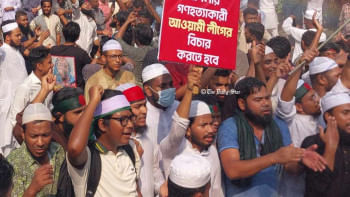Cafe attackers were 'suicide fighters'
Global terror outfit Islamic State (IS) in the latest issue of its online magazine Dabiq claimed that the five Gulshan café attackers were “inghimasi soldiers of Caliphate”.
Inghimasi is roughly translated as suicide fighter, according to jihadology.net, a clearinghouse for jihadi primary source material, original analysis, and translation service.
“Suicide fighters often work in tandem with suicide bombers, but the two are different in that the inghimasi are usually on foot, armed with grenades and light weapons, and operating in a group, while IS suicide bombers tend to sit alone at the helm of explosives-laden vehicles.”
Jihadology also says suicide fighters on the battlefield function as shock troops, seeking to loosen up enemy defence. They are also dispatched in small teams to strike non-military targets.
On July 1, the gunmen attacked Holey Artisan Bakery on Gulshan Road 79 on July 1 and held diners hostage.
Before the commandoes stormed the popular hangout in Dhaka's diplomatic zone to end the siege, 20 hostages, including 17 foreigners, were brutally murdered.
IS claimed credit for the attack.
US-based Site Intelligence, which monitors jihadi activities, later posted photos of the five youths, holding guns, saying the images were released by IS.
In the SITE post, the five were mentioned as “Dhaka attackers”.
To describe the café attack, Dabiq said: “On the 27th of Ramadan, five inghimasi soldiers of the Caliphate carried out an attack on the Artisan Restaurant, which is frequented by Crusader foreigners of varying nationalities, in the city of Dhaka. The mujahidin held a number of hostages as they engaged in a gun battle with apostate Bengali police, and succeeded in killing and injuring dozens of disbelievers before attaining shahadah.”
The latest issue of Dabiq, which is the 15th issue of the web publication meant for propaganda and recruitment, mentions “operation of IS” in Bangladesh over three months since late April.
In the “operation” chapter and under the heading “Bengal”, the magazine, named after the town of Dabiq in northern Syria, writes that on the 15th of Rajab (April 23), the soldiers of the IS assassinated a university professor in the city of Rajshahi for “calling to atheism”.
It also mentions killing of a Hindu minority tailor in Tangail, Sunil Gomes in Bonpara, Hindu priest Ananta Gopal Ganguli in Jhenidah and another Hindu minority man. In most of the cases, IS labelled the targets as mushrik (polytheist) or disbeliever.

 For all latest news, follow The Daily Star's Google News channel.
For all latest news, follow The Daily Star's Google News channel. 



Comments